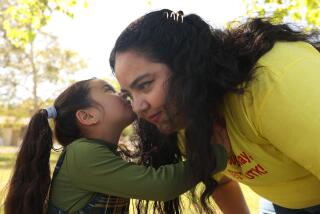CLAS Test Lets Students Utilize Facts Learned
- Share via
* Conscientious parents are continuing their examination of the CLAS test, which is supposedly the improved replacement for the old, inadequate CAP test (“Parents, Districts Can Exempt Students From State Testing,” April 29).
Some of them mistakenly believe that students taking the tests will be asked to answer questions which will cause a conflict with their personal or religious values. They are claiming that it is against the law to ask questions which ask for their “feelings” rather than quizzing them about facts.
It is true that the test does in fact dare to ask students to express their “feelings” about a particular piece of literature. It does, in fact, ask students, in its “Open Mind” exercise, to describe what a person or character might be “feeling.” It even goes so far as to ask students to share their ideas in group discussion (heaven forbid) and to express the results of their discussions.
In a world where a lack of ability to communicate adequately with one another causes violent crimes and wars, I feel forced to ask the following question: What in the world is wrong with learning to communicate one’s feelings and explore the feelings of others with regard to an issue or story which touches a common chord in any humane person?
There is a section of society arguing against group discussion and against any examination of the way an issue makes one feel. This is an argument for a sad regression to irrelevant rote education which has been so very popular with people who would measure education by the amount of facts stored in the head rather than what the person can do with those facts.
Facts by themselves are meaningless. What is important to an educated person is how to use the facts to support a point of view or to achieve a productive end. Education is about communication and the use of facts, not the mere accumulation of facts.
While there is no doubt that the procedure used to evaluate this new test is riddled with horrendous problems, the test itself is a positive step in the direction of meaningful education.
There might be other and better ways to spend educational funds than to use it on this test, but people want tests and accountability. So we have the CLAS test. If we are to have it, we need to make it relevant, not just a multiple-choice test on the repetition of facts.
MILTON B. ROUSE
Dana Point






